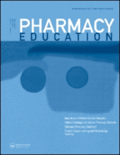
PHARMACY EDUCATION
Scope & Guideline
Pioneering advancements in pharmacy education worldwide.
Introduction
Aims and Scopes
- Competency-Based Education (CBE):
The journal emphasizes the development and implementation of competency-based education frameworks that prepare pharmacy students for real-world practice. This includes defining competencies, assessing readiness for practice, and creating educational strategies that align with these competencies. - Interprofessional Education (IPE):
There is a strong focus on promoting interprofessional education as a means to prepare pharmacy students for collaborative practice within healthcare teams. Articles often explore innovative educational experiences that foster teamwork and communication among healthcare professionals. - Diversity, Equity, and Inclusion (DEI):
The journal addresses the importance of diversity, equity, and inclusion in pharmacy education, highlighting efforts to recruit underrepresented students and create inclusive learning environments. This includes examining the impact of DEI initiatives on student experiences and outcomes. - Innovative Teaching Strategies:
Research on novel teaching methodologies, such as active learning, simulation-based education, and the use of technology in teaching, is prevalent. The journal promotes the exploration of evidence-based practices that enhance student engagement and learning. - Mental Health and Well-Being:
Given the increasing concern about mental health among pharmacy students, the journal includes studies focused on well-being, resilience, and strategies to mitigate burnout, reflecting a commitment to the holistic development of pharmacy learners. - Assessment and Evaluation:
There is a significant interest in the development and validation of assessment tools and frameworks to evaluate student learning and program effectiveness. This includes exploring various assessment methodologies, such as objective structured clinical examinations (OSCEs) and formative assessments.
Trending and Emerging
- Integration of Technology in Education:
There is a significant increase in research related to the use of technology, including virtual simulations, online learning platforms, and artificial intelligence, to enhance pharmacy education and student engagement. This trend reflects the adaptation to digital learning environments. - Focus on Social Determinants of Health:
Recent publications are increasingly addressing social determinants of health and their implications for pharmacy practice. This theme emphasizes the need for pharmacy education to incorporate health equity and cultural competence into curricula. - Mental Health Awareness and Support:
The journal is witnessing a rise in research focusing on mental health issues among pharmacy students and the implementation of well-being programs. This reflects a growing recognition of the importance of mental health in academic success and professional practice. - Professional Identity Formation (PIF):
There is a trend towards exploring professional identity formation among pharmacy students, with research examining how educational experiences shape students' perceptions of their roles as future pharmacists. - Community Engagement and Service Learning:
An emerging focus on community engagement and service learning initiatives is evident, promoting experiential learning opportunities that connect students with underserved populations and real-world healthcare challenges.
Declining or Waning
- Traditional Lecture-Based Education:
There is a noticeable decrease in publications centered around traditional lecture-based teaching methods. The shift towards active learning and experiential education has led to a decline in interest in conventional pedagogies that do not engage students actively. - Pharmacology Content Focus:
Research specifically dedicated to pharmacology content delivery is less frequently highlighted, as the journal increasingly prioritizes integrated approaches that encompass pharmacotherapy within broader clinical and patient care contexts. - Single-Discipline Focus:
There is a declining emphasis on research that pertains solely to pharmacy education without consideration of interprofessional or multidisciplinary contexts. The journal is increasingly favoring studies that highlight the importance of collaboration across health disciplines. - Standardized Testing and Assessment Models:
The focus on traditional standardized testing methods is diminishing, with a growing preference for alternative assessment strategies that emphasize competencies and real-world applications rather than rote memorization.
Similar Journals

AEM Education and Training
Transforming emergency care through quality research and training.AEM Education and Training is a leading peer-reviewed journal published by WILEY, focusing on the intersection of education, emergency medicine, and nursing, with a commitment to advancing knowledge and practice in these critical fields. Launched in 2017, this journal has quickly established itself as a key resource, as evidenced by its impressive Q2 ranking in both Education and Emergency Medicine, and a top-tier Q1 ranking in Emergency Nursing as of 2023. The journal aims to disseminate high-quality research that enriches educational practices and improves clinical outcomes, serving as a vital platform for healthcare educators and practitioners. With the growing importance of effective training in emergency settings, AEM Education and Training plays an essential role in shaping future leaders in health education and patient care. Researchers, professionals, and students will find an array of insightful articles that address contemporary challenges and innovations in their fields. Although currently not an open-access journal, its findings contribute significantly to the broader discourse in educational practices and emergency care.
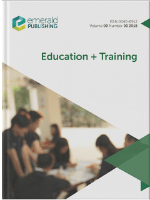
Education and Training
Shaping the future of learning with innovative methodologies.Education and Training is a leading peer-reviewed journal published by Emerald Group Publishing Ltd, dedicated to advancing the fields of education and professional development. With an impressive impact factor and recognized as a Q1 journal in both Business, Management, and Education, it serves as a crucial resource for researchers, educators, and practitioners. The journal's rich history, dating back to 1959, reflects its enduring commitment to delivering high-quality, research-driven insights that inform educational practices and management strategies. The Scopus rankings further affirm its significance in the academic community, showcasing its competitive position within the social sciences. Notably, the journal does not currently offer open access options, ensuring a curated audience of scholarly individuals who value rigorous academic contributions. By providing a platform for innovative research and thought leadership, Education and Training continues to shape the discourse on effective educational methodologies and enhance lifelong learning across various contexts.

JOURNAL OF FURTHER AND HIGHER EDUCATION
Leading the Conversation on Educational AdvancementJournal of Further and Higher Education, published by Routledge Journals, Taylor & Francis Ltd, stands as a prominent platform in the field of education, with a distinguished focus on further and higher education studies. With an ISSN of 0309-877X and E-ISSN of 1469-9486, this journal has been contributing invaluable insights since its inception in 1977. The journal boasts a remarkable Q1 ranking in its category for 2023, placing it in the top tier of educational research, underscored by its 83rd percentile ranking among Scopus Ranks in Social Sciences - Education. Researchers and practitioners alike are encouraged to submit their work, as the journal aims to foster innovative discussions and disseminate high-quality scholarly articles that address contemporary challenges in further and higher education. With its commitment to academic excellence, Journal of Further and Higher Education plays a crucial role in shaping policy and practice in the educational landscape, ensuring that the voices of educators and learners are heard and valued.
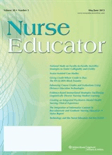
Nurse Educator
Inspiring the Future of Nursing Education and Practice.Nurse Educator, published by Lippincott Williams & Wilkins, serves as a pivotal resource in the field of nursing education and practice. With an ISSN of 0363-3624 and an E-ISSN of 1538-9855, this esteemed journal has been contributing to the development of nursing professionals since 1976 and is recognized for its impactful articles, reflected in its 2023 Q2 category rankings across various nursing and educational domains. Nestled within the competitive landscape of academic publishing in the United States, its substantial Scopus ranking underscores its significance, particularly in Nursing Fundamentals and Skills (Rank #7/15) and general nursing fields (Rank #52/139). The journal's scope encompasses essential topics pertinent to nurse educators, including pedagogy, clinical practice, and exam preparation strategies, ultimately aiming to enhance nursing education and improve patient care outcomes. By providing an engaging platform for innovative research and best practices, Nurse Educator stands as an essential resource for researchers, educators, and students committed to advancing the nursing profession.

ADVANCES IN HEALTH SCIENCES EDUCATION
Fostering Progressive Insights in Health Sciences EducationADVANCES IN HEALTH SCIENCES EDUCATION, published by SPRINGER, is an esteemed journal that stands at the forefront of educational research within the health sciences domain. With its ISSN 1382-4996 and E-ISSN 1573-1677, this journal has established itself as a vital resource for those committed to improving medical and health education. As a Q1 journal in both Education and Medicine (miscellaneous) categories in 2023, it boasts a prestigious standing in its field, ranked in the 91st percentile among the top educational journals on Scopus, firmly placing it within the global academic discourse. Aimed at researchers, professionals, and students, the journal publishes high-quality articles that promote innovation and best practices in health sciences education, reflecting a commitment to enhancing teaching and learning practices. With coverage from 1996 to 2024, it continues to provide a robust platform for progressive educational strategies in health. For those looking to advance their understanding of educational methodologies in health care, ADVANCES IN HEALTH SCIENCES EDUCATION remains an indispensable resource.

Perspectives on Medical Education
Advancing the Future of Medical EducationPerspectives on Medical Education, published by UBIQUITY PRESS LTD, serves as a leading platform in the fields of education and medical sciences. With a commendable impact factor and categorized in the prestigious Q1 quartile for both domains in 2023, this journal aims to foster innovative and critical discussions that advance medical education practices. As an Open Access journal since its inception in 2012, it ensures that research findings are disseminated widely, promoting accessibility and collaboration among researchers, healthcare professionals, and educators. Spanning a comprehensive range of topics, from curriculum development to pedagogical strategies in healthcare settings, the journal has established itself as a vital resource for those dedicated to improving medical education. With its strong Scopus ranks—81st in General Medicine and 218th in Education—Perspectives on Medical Education invites contributors who are eager to share their insights and research, ultimately striving to enhance the quality of education within the medical field.
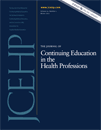
JOURNAL OF CONTINUING EDUCATION IN THE HEALTH PROFESSIONS
Transforming Knowledge into Practice in Health ProfessionsJOURNAL OF CONTINUING EDUCATION IN THE HEALTH PROFESSIONS, published by Lippincott Williams & Wilkins, serves as a pivotal resource in the interrelated fields of education, e-learning, and healthcare. Established in 1988, this esteemed journal aims to advance the knowledge and skills of healthcare professionals through innovative research and practical applications in continuing education. With an ISSN of 0894-1912 and an E-ISSN of 1554-558X, this peer-reviewed publication boasts a commendable reputation, reflected in its Q2 quartile ranking in the categories of Education, E-learning, and Miscellaneous Medicine for 2023. The journal is indexed in Scopus, ranking 546 out of 1543 in Social Sciences Education, placing it in the top 64 percentile. By focusing on the dissemination of impactful studies, the journal plays a critical role in shaping educational strategies that enhance professional development and improve healthcare delivery. Although not an open-access publication, it eagerly invites contributions from researchers and practitioners keen to explore the essential dynamics of continuing education in health professions.

Medical Science Educator
Innovating education to empower future healthcare leaders.Medical Science Educator, published by SpringerNature, is an esteemed journal committed to advancing the intersection of educational methodologies and medical science. With a significant impact in its field, this journal holds a Q2 ranking in both Education and Medicine (miscellaneous) categories as of 2023, reflecting its dedication to high-quality research and scholarly dialogue. Operating in a digital format, the journal uniquely facilitates access to pivotal studies from its inception in 2011 until 2024, fostering innovation in medical education. The latest rankings highlight its credibility, placing it at the 63rd percentile in Social Sciences - Education and the 56th percentile in Medicine - Medicine (miscellaneous) within Scopus. This platform serves as an invaluable resource for educators, researchers, and practitioners aiming to enhance teaching practices and shape the future of medical education.
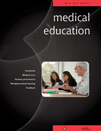
MEDICAL EDUCATION
Driving Excellence in Medical Training and Educational PracticesMEDICAL EDUCATION, published by Wiley, stands as a leading journal in the fields of education and medical training, holding a prestigious Q1 ranking in both the Education and Medicine (miscellaneous) categories for 2023. With an impressive impact illustrated by its 94th percentile ranking in Social Sciences Education, this journal has been pivotal in advancing research and discourse since its inception in 1966. Dedicated to enhancing the quality of medical education through scholarly articles, innovative methodologies, and evidence-based practices, MEDICAL EDUCATION provides a vital platform for educators, researchers, and practitioners. Although it does not offer open access, its comprehensive reviews and studies are invaluable resources for those committed to developing effective educational practices in the medical field. This journal is instrumental in shaping the future of healthcare education and fostering knowledge exchange among professionals.
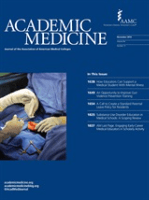
ACADEMIC MEDICINE
Pioneering Insights for Medical Educators and PractitionersACADEMIC MEDICINE is a premier journal published by Lippincott Williams & Wilkins, focusing on the multifaceted realm of medical education and training. Since its inception in 1940, the journal has become an essential resource for researchers, educators, and healthcare professionals dedicated to advancing the field of academic medicine. With an impressive Q1 ranking in both Education and Miscellaneous Medicine categories as of 2023, it ranks among the top publications in its field, reflective of its significant academic impact. The journal is indexed in Scopus, where it holds a commendable position within the 93rd percentile of Social Sciences Education, affirming its influence on contemporary medical education discourse. While not an open-access journal, ACADEMIC MEDICINE is committed to disseminating high-quality research, fostering knowledge exchange, and encouraging innovation in medical training across the globe. It serves as a critical platform for sharing the latest findings and practical insights in medical education, making it an indispensable resource for scholars and practitioners aiming to enhance their academic and clinical expertise.